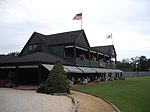Rumson-Fair Haven Regional High School
The Rumson-Fair Haven Regional High School (often abbreviated RFH) is a regional, four-year comprehensive public high school and school district in the eastern United States, serving students in ninth through twelfth grades from the suburban communities of Fair Haven and Rumson, which are situated on a peninsula bounded by the Navesink and Shrewsbury Rivers and the Atlantic Ocean, in northern Monmouth County, New Jersey. The school has been accredited by the Middle States Association of Colleges and Schools Commission on Elementary and Secondary Schools since 1940.Rumson-Fair Haven High School receives students from two middle schools, Forrestdale Middle School of the Rumson School District and Knollwood School of the Fair Haven Public Schools, as well as from private schools, including Rumson Country Day School and Holy Cross School. As of the 2020–21 school year, the school had an enrollment of 968 students and 82.0 classroom teachers (on an FTE basis), for a student–teacher ratio of 11.8:1.The district is classified by the New Jersey Department of Education as being in District Factor Group "J", the highest of eight groupings. District Factor Groups organize districts statewide to allow comparison by common socioeconomic characteristics of the local districts. From lowest socioeconomic status to highest, the categories are A, B, CD, DE, FG, GH, I and J.
Excerpt from the Wikipedia article Rumson-Fair Haven Regional High School (License: CC BY-SA 3.0, Authors).Rumson-Fair Haven Regional High School
Ridge Road,
Geographical coordinates (GPS) Address Nearby Places Show on map
Geographical coordinates (GPS)
| Latitude | Longitude |
|---|---|
| N 40.369 ° | E -74.002 ° |
Address
Rumson Fair Haven Regional High School
Ridge Road 74
07704
New Jersey, United States
Open on Google Maps









